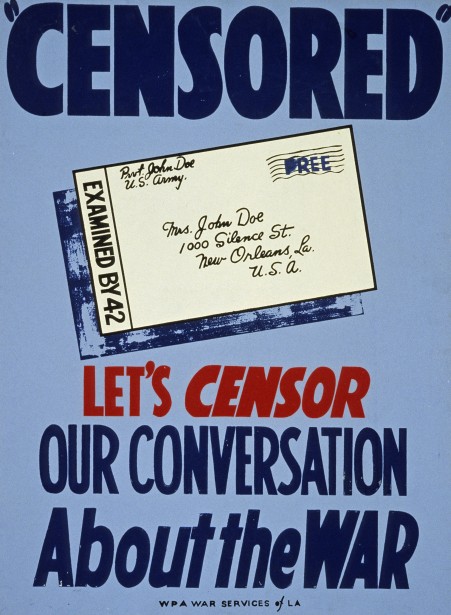
You may be wondering, what, precisely, censorship is. Well, as Nichole Moore, Professor of English and Media Studies and Associate Dean for Special Collections at the University of New South Wales, Canberra, states, “censorship is generally understood to be the official suppression or prohibition of forms of expression” (Moore). When an American such as myself thinks of censorship, one likely recalls the Cold War and the days of Joseph McCarthy, where films and other mediums were vigorously screened for anything that could even vaguely be construed as “communist propaganda” meant to “undermine the American way of life.” Censorship needs not be this explicit or in-your-face, however. The most insidious censorship is unnoticeable, in the form of choosing what gets published or produced, and what is available in the libraries, bookstores, and movie theatres of the world.
The question of defining censorship is also an integral one. For instance, in Moore’s native Australia, as well as in Canada, the location of our case, censorship is narrowly legally defined as being the pre-censorship of materials or media before they are published. By this legal maneuvering, for instance, allowing the publishing of a book and then immediately banning it would not legally be censorship, which is utter nonsense. This definition also ignores the power of many smaller actors to control what viewpoints their local public has access to. The local librarian, school district administrator, or even teacher has an immense amount of power in their hands by deciding what is to be available and what viewpoints are going to be most widely represented. For instance, if a local library has an overwhelming amount of literature from one political viewpoint and almost none from another, equally prominent viewpoint, that is clearly problematic. Censorship can be especially dangerous or effective (depending on one’s perspective) with regards to the education of children.
Children are still developing mentally, and thus their viewpoints are especially moldable by parents, teachers, and the media they interact with. It is within this conflict that the case here represented by this website is situated. This website is concerned with the challenging and banning of The Golden Compass from a public Catholic school in the Regional Municipality of Halton in Ontario, Canada for supposed anti-Christian and anti-Catholic influences. The following statement found in The Star is the only direct quote we were able to locate from the complainant:
“The book is apparently written by an atheist where the characters and text are anti-God, anti-Catholic and anti-religion.”
This banning is situated at the crossroads of the conflict between the fear of children being influenced by what they read and the encouragement of free-thinking. No matter where one stands on censorship in general, censorship does not occur in a vacuum, and therefore it is valuable to study cases like this to better understand the reasons a book may be kept or censored and to better develop one’s viewpoint using a real incident instead of speaking in abstract terms not necessarily rooted in reality.
Source Cited:
“Censorship.” Censorship | The Canadian Encyclopedia, www.thecanadianencyclopedia.ca/en/article/censorship.
Moore, Nichole. “Censorship Is.” Australian Humanities Review, vol. 54, 2013, pp. 45–65.
“School of Humanities and Social Sciences.” UNSW Canberra, 18 Apr. 2019, www.unsw.adfa.edu.au/school-of-humanities-and-social-sciences/professor-nicole-moore.